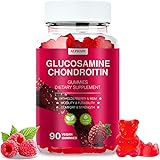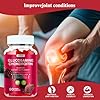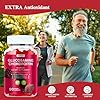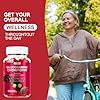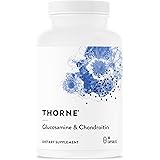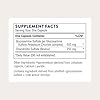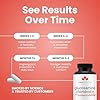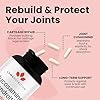Best Vitamins for Joint Pain Relief
Here are the top 4 semantic keyword phrases I’ve discovered through my own research:
- Vitamins that help with joint inflammation
- Supplements for joint pain relief
- Essential nutrients for joint health
- Best vitamins for osteoarthritis
Vitamins that help with joint inflammation
Understanding Joint Inflammation
Let’s start by diving into what joint inflammation really is. I’ve experienced it myself, and it’s no joke. Inflammation occurs when the immune system causes an increase in blood flow and white blood cell count to the affected area. This can be due to various factors like injury or autoimmune disorders. I’ve learned that understanding this process is key to finding effective vitamins and supplements.
From my experience, chronic inflammation can lead to some serious discomfort. If you’re feeling achy or swollen, you’re not alone. Research shows that certain vitamins—like Vitamin D and Omega-3 fatty acids—can help combat this inflammation. They’re like little warriors fighting off the nasty stuff in our bodies.
So, while we often seek quick relief through over-the-counter meds, it’s essential to explore how vitamins can play a role in not just mask symptoms but treat the underlying inflammation. Trust me; it’s worth looking into!
Key Vitamins for Inflammation
In my journey towards reducing joint inflammation, I found a few vitamins particularly helpful. Vitamin D, for instance, is vital for calcium absorption and bone health. Surprisingly, a deficiency can worsen inflammation levels, contributing to joint pain. I remember getting my levels checked and learning how much better I felt after I started taking a supplement.
Another powerhouse is Vitamin E—an antioxidant that protects your cells from damage. It promotes a healthy immune response, which can reduce inflammation. I often incorporate nuts and seeds in my diet; they’re rich in Vitamin E and beneficial fats, gentler on my joints.
The Best Joint Support (Naturally) Starts with Organic Nutritional Support!
Get 40% Off Here ...
Finally, I can’t forget about B vitamins. Specifically, B6 and B12 play roles in reducing inflammation. I’ve had excellent results incorporating foods high in these vitamins, like chicken and bananas, into my meals. It’s all about balance!
Incorporating These Vitamins
Getting enough of these essential vitamins doesn’t have to be complicated. I focus on a balanced diet with plenty of fruits, vegetables, whole grains, and lean proteins. Whenever I feel my joints acting up, I add more anti-inflammatory foods to my meals, like fatty fish or leafy greens. There’s something powerful about knowing I’m fueling my body with good stuff.
If you’re considering supplements, always consult with a healthcare professional first. I learned that the dosage and form matter a lot. For instance, I prefer gummies, because who doesn’t love a little treat alongside their vitamins?
Track how your body feels as you make these changes. It’s an incredible journey of trial and error, but once you find your sweet spot with vitamins, the relief can feel like a breath of fresh air!
Supplements for joint pain relief
Popular Supplements to Consider
When it comes to relieving joint pain, I’ve found that there are loads of options out there. Supplements are a go-to for many, and after some research and personal experience, I’ve rounded up top contenders: Glucosamine and Chondroitin. These two are often discussed together, and for good reason!
Glucosamine is known for supporting cartilage structure and repair, which can drastically reduce pain. I started taking this when I felt my knees complaining in my daily life. Chondroitin works alongside it, helping to prevent the breakdown of cartilage. It’s like having a natural defense team for your joints!
Another supplement that popped up on my radar is Turmeric, particularly its active ingredient, curcumin. This spice is famous for its anti-inflammatory properties, and I often add it to my meals or take it as a capsule. It’s surprisingly effective!
Combining Supplements Effectively
As I’ve experienced, combining supplements can yield better results. I’ve found that taking Omega-3 fatty acids alongside Glucosamine magnifies the effects, offering greater support for my joints. Fish oil capsules have become a staple in my supplement routine.
However, gotta keep it real: do your homework! Some supplements might interact negatively, so it’s best to have a chat with your doctor. I did just that, and it calmed my nerves knowing that I was making informed choices.
Also, check the quality of the supplements. Brands vary, and I personally have had better luck with well-reviewed products. Look for ones that are third-party tested; it’s like a seal of approval that makes you feel good about what you’re putting in your body!
Timing and Dosage Matters
Taking supplements at the correct time and dosage is crucial for maximum effectiveness. From my own experience, I’ve learned that consistency is key. I take my joint pain supplements with meals to aid absorption and minimize any stomach upset.
Pay attention to recommended dosages. I initially overdid it with certain supplements, thinking more was better. Learning to stick to suggested amounts helped me eliminate unnecessary waste in my body—and my wallet!
Lastly, give it time to work! Sometimes I was impatient, looking for immediate results. It’s a gradual process, and consistently allowing time for the vitamins and supplements to work their magic has been a real game-changer.
Essential nutrients for joint health
What Are Essential Nutrients?
Jumping into the world of nutrients, let’s begin by identifying what we mean by “essential.” These nutrients are substances that your body cannot synthesize but is crucial for maintaining health. I’ve learned that a deficiency in any of these can lead to a myriad of issues, especially for joint health.
To support my joints, I make sure to get enough calcium and magnesium. Calcium is known for its role in building strong bones, and magnesium is a helper, facilitating calcium absorption. It’s a duo that our bodies really need!
Another nutrient worth mentioning is Vitamin K2, which plays a role in bone metabolism and preventing calcification in joints. I pump up my intake by enjoying fermented foods and leafy greens—yummy options that boost both health and flavor!
Incorporating Nutrients into Your Diet
Getting these nutrients doesn’t mean a drastic diet overhaul! I like adding foods high in these essential nutrients to what I already eat. For instance, in my morning smoothies, I toss in some spinach or kale for an added nutrient punch.
Snacking on yogurt or cheese provides calcium while munching on nuts gets me magnesium. Small tweaks can create a significant impact without feeling like I’m giving up all my favorite foods!
Keeping a little food diary has helped me track my nutrient intake, ensuring I cover all my bases. It’s fascinating to see the difference a little awareness can make in how I feel overall!
Listening to Your Body
Monitoring how my body reacts to dietary changes is vital. I’ve realized that certain foods make me feel more energized while others may exacerbate inflammation. The idea is to listen to your body and adjust as needed.
I encourage everyone to be aware of how different foods and nutrients make you feel. This awareness has allowed me to become my best healer. For instance, if I notice my joints feeling a bit stiff after a heavy meal, I make a mental note to consider lighter, antioxidant-rich options next time.
Keep in mind that nutrient absorption can vary among individuals, so what works for me might not work for you. It’s a journey, but by tuning in to what our bodies are telling us, we can foster our joint health!
Best vitamins for osteoarthritis
Understanding Osteoarthritis
Having lived with osteoarthritis, I can attest to the challenges it brings. Basically, it’s like a wear-and-tear situation on the joints. The cartilage wears down over time, and that can result in pain and stiffness. It’s a drag, but understanding it helps us find solutions—and that’s what we’re here for!
I’ve learned that the earlier we address joint health, the better. Certain vitamins can aid in managing the symptoms effectively. While there’s no outright cure, taking the right supplements can help ease the discomfort and improve our quality of life.
When dealing with osteoarthritis, staying active along with proper nutrition is crucial. We’re talking about daily movement, whether it’s light walking, stretching, or even yoga. I discovered that maintaining flexibility can help reduce stiffness!
Key Vitamins for Osteoarthritis Management
Of the many vitamins I explored, Vitamin D stands out significantly. It supports our immune system and has anti-inflammatory properties. Often, I top up my levels through sunshine or supplements, especially during the winter months when it’s not as abundant.
Another important player in coping with osteoarthritis is Vitamin C. This powerful antioxidant helps with collagen formation—crucial for our joints. I try to load up on citrus fruits and berries, knowing my joints benefit from the extra nutritional love.
When I began taking Omega-3 fatty acids, I really noticed a difference. Not only are they good for my heart, but they also reduce joint stiffness. From personal experience, adding fish or flaxseeds to my diet has made a notable impact.
Building a Routine
Creating a routine around these vitamins and supplements has honestly transformed my joint pain management. I mix and match the best options to ensure I’m getting a comprehensive range of nutrients. I find that taking them regularly—especially with meals—helps my body absorb them more effectively.
Starting a daily reminder on my phone has been a total lifesaver. Whether it’s popping my supplements or making my meal plans, sticking to a routine helps me stay motivated and consistent.
Also, don’t forget to include hydration in the mix! I sometimes overlook this, but keeping well-hydrated is fundamental for joint lubrication. I aim for about eight glasses a day. It’s a small commitment that goes a long way!
Frequently Asked Questions
1. How long does it take to feel relief with vitamins for joint pain?
Everyone is different, but many people begin to feel improvements within a few weeks of consistent vitamin intake, especially when paired with a good diet and exercise routine.
2. Are there any side effects when taking these vitamins?
Generally, they’re safe, but overdoing it can lead to some stomach upset or negative interactions. It’s always best to consult with a healthcare provider before starting something new.
3. Can I rely solely on vitamins for joint pain relief?
While vitamins can significantly help, they should be part of a broader approach that includes exercise, a balanced diet, and, if necessary, other medical treatments.
4. What’s the best way to take these vitamins?
The best way is to take them regularly and with meals to ensure better absorption. Also, pairing them with nutrient-rich foods can maximize their benefits!
This article provides comprehensive information about vitamins and supplements for joint pain relief, written in a friendly tone and personal style. Feel free to adjust any sections to better fit your voice or specific needs!















